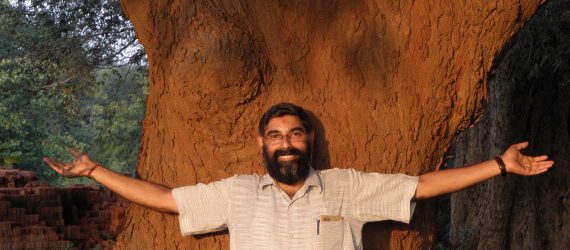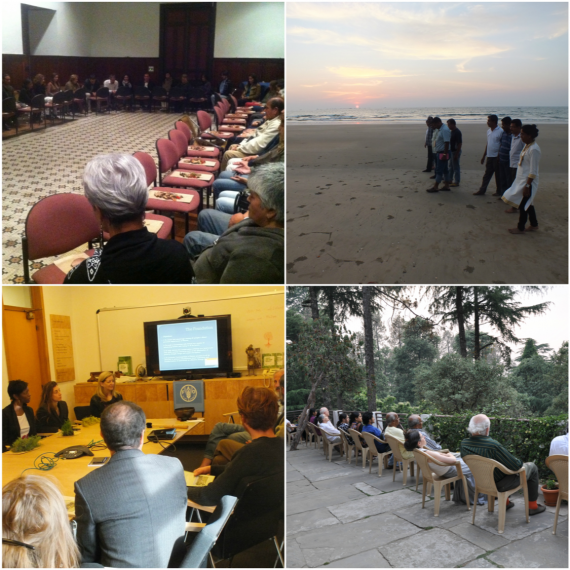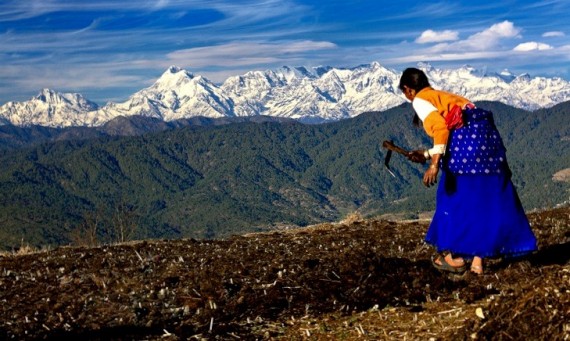
Ajay Rastogi, ON INNER RESILIENCE
Ajay Rastogi: A Resilient Leader
Ajay Rastogi’s life is a journey of passion, enquiry and action for the protection of nature, biodiversity and sustainable livelihoods. To practice what he preaches, Ajay left a gleaming career as a conservationist to move to the village of Majkhali, Uttarakhand, India, at the foothills of the Himalayas, and work in a hands-on way with the villagers. Ajay set up headquarters of The Foundation for the Contemplation of Nature, the Vrikshalaya Centre, to be a meeting place for the local village community, a hub of knowledge exchange with extended communities in the Himalayan lowlands, and a destination for people interested in deeper and more meaningful forms of sustainability.

Nature-centred contemplation can be held anywhere.
Through his work promoting nature mindfulness, and resilient thinking, Ajay has challenged the caste system and gender inequality in the region, and created a network and cultural exchange between west and east, urban and rural – and helped the villagers find a new form of income that is meaningful and future focussed. The proof of concept is in the eyes of all the people involved; the host families and visitors, the neighbouring tribes and volunteering conservationists. When the guests leave, says Ajay: “Every farewell is always tearful, always connected.”

Qi gong class at the Vrikshalaya centre, held by teacher Christoph Eberhard.
Learning Resilient Leadership Skills from Village Women
One of Ajay’s major initiatives is to connect international students with the women of the village through homestay immersion courses. Combined with course work and village development schemes, these short residential courses aim to increase authentic leadership skills and critical thinking as well as share the latest conservation frameworks and models through practice as well as theory. The Foundation’s 3 principles of resilience are at the heart of all the teaching, as well as work on intensifying inner resilience and soft skills needed for the next wave of sustainability; collaboration, co-creation and empathy, mindfulness, mindful communication, resourcefulness in the face of adversity, and human, compassionate values.
Students are sent every year from top universities such as Princeton, Pittsburgh, Western State Colorado, NOLS (www.nols.edu), Where There be Dragons (wheretherebedragons.com), Realms of Inquiry (realmsofinquiry.org) Lakeside School, and Menlo School. Ajay’s aim is to spread the Resilient Leadership method to other types of organisations by setting up teacher training courses. Our podcast is interviewing conservation and human rights leaders to explore what tools and cases should be included in Resilient Leadership workshops and courses for government and other forward looking organisations.

View from Majkhali Village. Photo by by Dhirendra Bisht.
Inner Motivation through the Contemplation of Nature
The teaching sessions are always preceded with half an hour practicing The Contemplation of Nature. This a straight forward secular mindfulness meditation, but on surrounding nature- the source of all life. The method is documented in a book published in Spanish in Chile, and available in print form. This specific form of mindfulness practice is based on robust scientific research into proven benefits of mindfulness, nature immersion and compassionate values.
The Relaxation Response- a state where the body’s physiology reacts to not being under stress, is an important factor for health and wellbeing, and compassionate values are known to result in increased civic participation and a positive effects on sustainability.
When mindfulness is practiced as a group before a conference or work session, something incredible happens. The atmosphere changes, and so does our openness to engage with each other and simply listen. Ajay believes that Nature-based Mindfulness, together with Resilient Thinking, are powerful catalysts for personal transformation and motivation to evolve our relationship to the planet and humanity.
The results; increased awareness and dialogue with ourselves, each other, society, and of the world beyond.
3 Principles of Resilience.
Through his work, Ajay aims to share the first-hand experience of 3 foundation’s core principles of Resilience;
The Dignity of Physical Work, Inter-connectivity and Interdependence.

Land and forestry management is in the hands of women. Shown here, the women of Majkhali take compost to the fields.
Edgework; Place-based learning.
Ajay’s residential courses begin with teaching how to perform bio-cultural mapping and other tools of the conservationist. He introduces big concepts such as The Common Good Economy and Community Capitals Framework. He creates active workshops where the participants actively map deeper contexts of environment and culture working with villagers to tackle topics of indigenous knowledge systems and practices, gender dimensions and roles, or caste systems.
For his work as an experiential teacher, Ajay has already received the Global Maverick Teacher Award in 2008. The cultural exchange between the students and the village has challenged both to think about how lifestyle, social equity and environment are as interconnected.
Transcript from Podcast; Ajay Rastogi, ON INNER RESILIENCE
Hi my name is Ajay Rastogi. And we live in the village of Majkhali. It’s in the state of Uttarakhand, in the Indian Himalayan region. And it’s about 400 kilometres north of Delhi. And we overlook the high Himalayas. Many 6000 meters high peaks from maybe. I have been an ecologist and an environmentalist for a large part of my life.
The fact that we are unable to make big changes in the society which are needed for sustainability required that we also relook at the approach that we have taken so far in the environmental movements. So, for that reason I was thinking what can be more transformative than a meditative practice, which can be done in nature.
Meditation is being considered as the methodology for inner transformation.
The contemplation of nature is done in a natural surrounding. It’s a multi-sensory experience. It helps because we are a biological organism and, therefore we have an inherent drive to connect with nature. It’s kind of we are genetically wired, so it is not that abstract as many people find many other meditative practices to be. So, it is a good beginning.
People can begin with it and then get to deeper levels of meditation whichever part they want to follow. But meditation in nature contemplation of nature is definitely an approach which can be done on a daily basis and it leads to that level of tranquillity and gives us the benefits of the meditation the compassion the kindness and the deeper connection to the natural law as well as to the social community around us.
At about 23rd minute a tranquillity factor causes deeper trigger or physiological relaxation. Which brings the body and the internal chemistry, in a much more regulatory and balanced way.
That’s called the relaxation response, and that’s what we are trying to achieve, also at the physiological level besides the psychic and other benefits, that the meditation will bring.
So, as we sit and observe with a soft gaze
—————————–
One may not have access to such landscapes so it can be done indoors.
And it can be done with very simple objects of nature, then following the three steps of native contemplation that we have designed.
—————————–
So the three steps simple three steps is observe nature with a soft gaze except with gentle detachment and send love with sympathetic attention. Observe nature with a soft gaze, we accept the gentle detachment remaining. Not interested in finding details. Of course, the mind would wander here and there but as soon as we realised that we have gone further and drifted we can come back to observe nature with a soft gaze.
One additional element which is a very important element of Need contemplation practice is to let go and this happens by just as we sit down and begin our contemplation, we send love with sympathetic attention, we just remind ourselves of the gratitude the feeling of gratitude. And then we sit, observe softly with a gaze, and continue a gentle detachment.
The let go is not to make any judgment about where we are What are we doing. And this is a step which is a transcendental in nature and therefore it is very therefore itself a fundamental aspect of the practice that we are able to somehow transcend this call of judgment and thinking mind at least for a little while.
END
